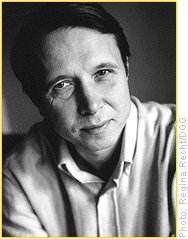S & H Recital Review
Schumann, Tchaikovsky Mikhail Pletnev (piano). Barbican Hall, Sunday, March 23rd, 2003 (CC)
Mikhail Pletnev’s recital, recorded for telecast on BBC 4, showed once again this pianist’s unpredictability. Heart-stoppingly beautiful moments vied with Pletnev the eccentric to leave one frustrated.Excerpts from Schumann’s Bunte Blätter, Op. 99 boded well. The eloquent simplicity of the chordal world of the first Albumblatt complemented the fast and even second. Point-making threatened to steal in the third Albumblatt, however, a trait which was to be much more marked in the Fantasie. Perhaps it was the fourth (Sehr langsam) which was the most successful of Op. 99, Pletnev highlighting the harmonically advanced language.
The Fantasie brought out the best and worst of Pletnev. Unfortunate, perhaps, that Uchida recently gave an unforgettable performance of this same piece over the road at the QEH recently: memories were still fresh. Two facets of Pletnev’s interpretation seemed the greatest hindrance: over-pedalling and a tendency towards the somnambulistic. The approach to the climax of the march was particularly cacophonous and distracting. Some concerns over Pletnev’s realisation of Schumann’s voice-leading early in the performance were confirmed by the finale, where harmonic directionality was more confused than veiled and beautiful. Uchida strived to bring the listener close to the composer; this, however, was very much Schumann arranged by Pletnev.
The fascinating repertoire choice of Tchaikovsky solo piano music for the second part augured well (again, interesting that excerpts from Tchaikovsky’s The Seasons were heard again at the QEH, in Jablonski’s recent recital). The Dumka in C minor, Op. 59, (1886) is a marvellous, extended piece of writing, subtitled ‘Russian Rustic Scene’. Memories of Lang Lang at the Wigmore in November 2001 were not, unfortunately, erased. Pletnev could not resist being over-languorous in the opening section (some effective subsequent right-hand decoration could not excuse him). The episodic nature of this composition was emphasised by Pletnev’s characteristic way (he was much more in his element in the more flamboyant passages).
In his programme notes for Tchaikovsky’s Grand Sonata in G, Op. 37 (1878), Gerald Larner states that, along with the Second Piano Concerto, this sonata needs ‘an inspired performer to reveal [its] qualities’. A daring statement which entrusts much to the interpreter! Pletnev was more inside this piece than the rest of the programme, but whether or not one left feeling that this was a neglected masterpiece is another matter.
The first movement is marked, ‘Moderato e risoluto’. Risoluto here certainly, but literalism crept in later. It was good, however, that Pletnev highlighted various musical influences: Chopin made a veiled appearance in the melancholy of the second movement, while Liszt reared his head in the coda to the first. Pletnev coped with the complexities of the Scherzo well, the movement emerging as flighty and even jaunty (not traits readily associated with this pianist). The roof-raising virtuosity of the finale predictably brought a warm response from the Barbican audience.
The question with Pletnev seems to be whether insights balance out eccentricities. On present evidence the answer appears to be ‘no’, despite some musically enriching moments.
Colin Clarke

 Return to:
Return to: